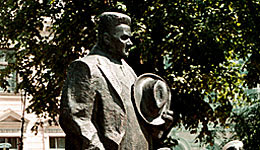 I woke up this morning to learn that there is no working class. The tree I photographed in Bread Street has perhaps learned that “Europe is based on an ironic denial of Eurocentric identity” – irony itself is a European value (up there with Christianity, which is still okay though "nationalism" is dubious) according to The Future of Europe, a fascinating concoction of insights mixed with McViews that I came across whilst looking at Atis Lejiņš’s output at politika.lv of late (he’s one of the authors -- the pamphlet is also available in English).
I woke up this morning to learn that there is no working class. The tree I photographed in Bread Street has perhaps learned that “Europe is based on an ironic denial of Eurocentric identity” – irony itself is a European value (up there with Christianity, which is still okay though "nationalism" is dubious) according to The Future of Europe, a fascinating concoction of insights mixed with McViews that I came across whilst looking at Atis Lejiņš’s output at politika.lv of late (he’s one of the authors -- the pamphlet is also available in English). Veiko Spolītis spares me the need of giving you some snapshots of the latest interpenetrations in Latvian politics – his excellent blog, Baltic, presents the most recent leaping and scurrying of our blessed political elite, and his remark about “gravedigger” Jānis Dinēvičs’ urgings to drop the "Workers'" from the name of the venerable Latvian Social Democratic Workers’ Party (LSDSP) and get rid of the red rose, replacing it with a supposedly more authentic and somehow more "European" red carnation, led me to look at those sociķi again. There's a lot to look at lately, primarily because Atis Lejiņš has thrown in his lot with them. Born in Latvia during the War, Lejiņš became known among Western Latvians for his personal expedition to Afghanistan during the Soviet invasion -- his noble aim was to try to rescue captive Balts from the Mujahideen, on the grounds that they had been pressed into service by the occupying Russians. Once Latvia regained its freedom, Lejiņš founded the Latvian Institute of International Affairs, a respected think tank.
I admire Lejiņš and find his position worthy of attention -- Latvia, a country where the Left was extremely influential, is now pretty much bereft of a national Left ("national" is the key word here -- according to Dainis Īvāns, Harmony Center was trying to usurp LSDSP's place in the European Left, leading to a burst of activity on the part of the party -- Harmony Center is far more "Russian" than it is leftist, and the "Russianness" of the Left is a big reason it's weak). Lejiņš has announced that at age seventeen, he decided to devote himself to destroying the Soviet Empire. That was premature, but the Empire did fall -- and he's now decided that his new mission in life will be the revival of the Left in Latvia.
The idea appeals to me, in principle. I daresay that I've always been strongly attracted to LSDSP -- in principle. Uldis Bērziņš used to wander the libraries and taverns trying to get every writer to join -- his vision was idealistic and based in the continuity of the party, which has always had its wings and severed wings. I was twelve years old when Vilnis Zaļkalns and other exile sociķi in Sweden inspired my little brain to reassess the right-wing historiography I'd been fed by the Latvian community in Chicago. "Capitalism with a human face" in laissez-faire Latvia would be nice, very nice.
The trouble is that the traditional party -- which has a rather controversial history, too, some sociķi having eagerly collaborated with the Soviet invaders at first -- was addled by the addition of disreputable "post-Communists."
Dinēvičs is right in a sense -- the worker as the Left once conceived of him (and her) is probably not just dead but past his or her burial date. But the party always included the "progressive intelligentsia" and farmhands, too, as the article (in Latvian) on Dinēvičs' proposal says -- what the article doesn't really talk about is how doctrinaire the party was, clinging to the Erfurt Program (the Menders wing [or "the Muscovites"] took over the party between the wars, with "Western" social democrats like Cielēns distancing themselves and acknowledging the failures of their approach; though it was the largest party and got the largest share of the vote, LSDSP almost always avoided actually governing -- to do that would have required compromise and the dilution of its dogma).
As to the rose -- Dinēvičs is wrong. It's used by many a Western European social democratic party and group, from France to the UK (where "Labour" remains in the name). Can you get to "New Labour" when you have to cross such a cesspool (it's appropriate that Dinēvičs is accused of helping the scandalous "garbage interests" in Rīga [one thinks of the truck at the end of Once Upon a Time in America, and of Dinēvičs having presided over the collapse of Latavio, restored Latvia's first airline -- a few of its pilots ending up in prison in the Punjab]), or leap to a "new" democratic Left when the old one, cleft and crushed (both by the rightist regime in Latvia and by the Soviets -- even "the Muscovite" Menders, along with other LSDSP members, was persecuted during the occupation), seems to have survived in name only? A rose is a rose is...
Labels: latvia, lsdsp, politics, social democracy, socialism
 There's a cute Facebook group called Dictators Who Kiss Children in Front of Cameras. Jānis Bērziņš at Reveries has a verbal gold watch for Fidel.
There's a cute Facebook group called Dictators Who Kiss Children in Front of Cameras. Jānis Bērziņš at Reveries has a verbal gold watch for Fidel.



